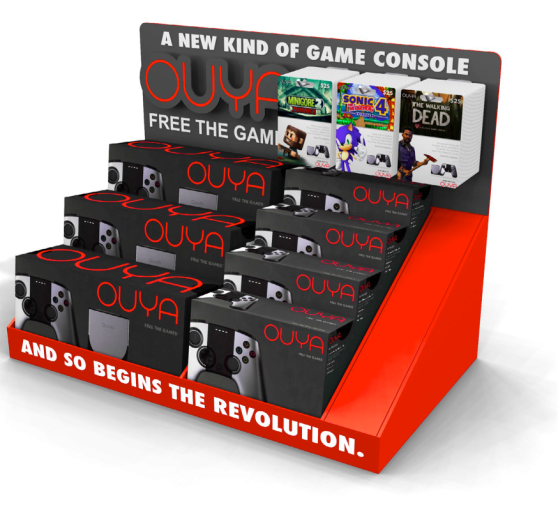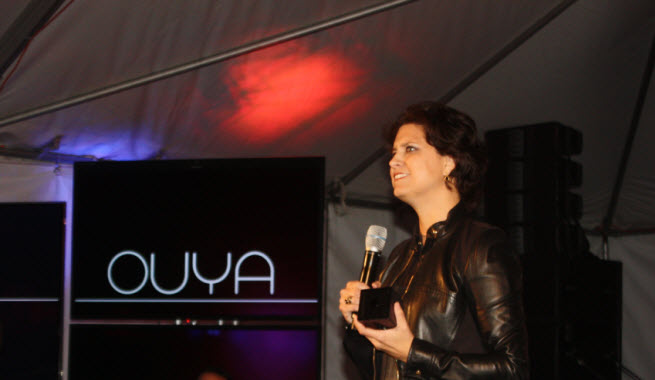
Above: Ouya’s custom retail display that gamers will find in Target stores soon.
GamesBeat: Do you think there’s a future for cloud gaming in the Ouya platform?
Uhrman: There is absolutely a role for cloud gaming on Ouya. We’re talking to a number of the parties that support cloud gaming. It would bring content to Ouya that our hardware may not support today, but that will play wonderfully — and were built to be played in the cloud. … There are certain types of games where the idea of cloud gaming will work, and there are others where it won’t work. To be able to have a low price point for a box, it’s going to be great for gamers.
GamesBeat: Can you reveal who your cloud gaming partners are?
Uhrman: All the one’s you’re thinking.
GamesBeat: When are the annual Ouya updates going to start?
Uhrman: Annually … 2014! … We’re really focused on the current product today, we’ll start thinking more about it next year. We do anticipate a refresh of Ouya next year with an improvement of our processor and potentially adding more features and functionality.
GamesBeat: How are you approaching the holiday season?
Uhrman: We’re focusing a lot on retail. We want to support the retail channel, so people who walk into retail stores and know what Ouya is can find it. We’re testing some pop-up stores, specifically in San Francisco, and partnering with retail in New York. We think there’s a great benefit for people being able to touch and experience Ouya. We’re going to be much more focused online too.
Heading all of that up will be our new head of marketing Patricia Parra — she came to us from Hulu and HBO.
GamesBeat: Are you at all worried about microconsole fragmentation?
Uhrman: I’m not worried. We have a really loyal, engaged community of gamers and developers, and we’re starting to see great content come to Ouya first and then migrate to other platforms. Based on the content that we know is coming out in Q4, we feel really confident that our community’s going to grow.
GamesBeat: You seem really poised to enable third-parties to create Ouya hardware as well, is that something you’ve ever considered?
Uhrman: What’s most valuable about Ouya is the community and our relationship between gamers and developers. And the Ouya storefront is [also] of great value. So, yes, if there is a partner product on the market with the exact same specifications — so there’s no fragmentation for the developer — would I be open to putting the Ouya storefront on it? Absolutely. But what I don’t want to do is fragment my audience of developers and make things harder for them.

Above: Ouya’s game library.
GamesBeat: You were also talking about potentially refreshing the Ouya hardware next year, how are you going to deal with fragmentation there?
Uhrman: Very carefully … we’re having conversations with a lot of the game engine [makers] and developers in relation to what we choose, and how do we build our tools to support devs the best way we can. … It won’t be something that we think up on our own and launch it. By the time we launch it, we’ll have the buy-in of our community, because that’s how we do everything.
GamesBeat: How do you feel about the feedback you’ve gotten on the controller? And would a new controller be part of the hardware refresh?
Uhrman: I’ve been thrilled with the feedback — it means that it’s working, that this relationship we’ve developed with gamers and developers is working. They care enough to tell us how to make it better. The controller has improved drastically since we first debuted in March. The substructure of the action buttons have been firmed up. The tension of the triggers have been firmed up. The feel of the thumbsticks have been updated.
The fact that people didn’t know batteries go under the faceplates, we’ve improved by putting a sticker showing it. … The controller has gotten significantly better — also in terms of improving the latency and lag and making it the best experience gamers can have. That’s one of the things that’s great about Ouya. We’re never finished, it’s always going to get better. And it gets better because our community cares enough to tell us how to make it better.
GamesBeat: TowerFall seems like the closest thing you’ve got to a “killer app” right now. Are you thinking about how to bring more to the platform?
Uhrman: Killer apps are important. TowerFall was by far the first game most people were really excited for on Ouya, and it continues to be one of our most popular games. The most popular game today on Ouya is Fists of Awesome by Nicoll Hunt, which was a Kickstarter game that was a demo on our platform. … That speaks to the value of having a demo and getting an audience behind you for when you’re ready to launch.
There are games that have come organically to Ouya in our top 5 that we didn’t find by going to a festival,or going to a conference, or soliciting developers. Our killer apps will always be a combination of us going to find great developers and bringing their content to Ouya, and just the nature of what Ouya creates by giving creative freedom to developers. They have the platform of their choice, the I/O device of their choice, to build the game they want. And as a result it will become a hit. Amazing Frog is one example. BombSquad is another.
When we have this conversation three months from now, the killer app we’ll be talking about, I don’t even know what it is today. But it’ll be the killer app. We’ll find it together.
GamesBeat: Will you be working with Yves Behar again on the next Ouya? [The renowned designer of Jawbone’s products, and plenty of other gadgets.]
Uhrman: We are. Yves is our creative cofounder, he’s a very important member of the team, as we think about our console and the controller, and incorporate feedback from the community, he’ll play a very strong role.
GamesBeat: How do you feel about how the “Free the Games” fund has gone so far?
Uhrman: I’m thrilled that the Free the Games Fund is live and is doing well. We had our first funded game last month, Neverending Nightmares, which had a $100,000 goal. It’s a great story that Matt Gilgenbach is making about mental illness, and it’s an important story that he’s bringing to Ouya.
Free the Games did go through an evolution, the idea behind it was that we wanted to find great content. We felt like with a team of three on our developer relations team, going to conferences and festivals and scouring the web, we were going to miss something. So we thought, given what a jumpstart Kickstarter was to our existence, and being such great platform for game developers to find their audience, we thought it would be a great way to support game developers and find great content for Ouya that we might not have found on our own.
It’s one way we find content, it’s not the only way. The spirit behind the fund was really, if a game received enough support, we would love to bring it to Ouya. The reality was we didn’t put enough controls in it [the fund]. We allowed people to game the system. And it took us a while to figure out what the best way to update the rules would be to make it work for everybody. Initially we really wanted people to follow the spirit of the rules. When people said that wasn’t going to happen, I naively and idealistically still held my ground and said, “Give it time, it’s really going to work!”
What really turned the tide for me is we read the feedback was developers saying, we know what you’re trying to do, but it’s not really working. And at the end of the day, it’s not going to benefit me. That’s when we knew we had to change the rules. The whole point of Free the Games was to benefit developers. Then we spent about a week — probably a week too long in many peoples’ eyes — talking to developers and finding out how can we make this work for you. What are the best rules?
And when we looked at the average dollar we spent funding games, it wasn’t $50,000. So we lowered the goal to $10,000 and said we wouldn’t fund you above and beyond your goal, because it was disincentivizing the spirit of our fund. We wouldn’t do the $100,000 bonus at the end. … We tied the exclusivity specifically to the amount of dollars we gave you. We’re very pleased to see with how it’s resonated with the community.
One of our more vocal detractors during that period was Sophie Houlden who brought us Rose and Time. We had a great relationship with Sophie. … She just felt that, regardless of our best intentions, the program wasn’t working and the fact that we were holding firm to it just sort of made it worse. And she ended up pulling her game from Ouya and she wrote a really long blog post saying she wasn’t happy about the situation. …
Yesterday, she asked us to bring Rose and Time back to Ouya, and she wrote a great blog post basically saying I didn’t think you guys could pull it off, but everything you’ve done and everything you’ve showed me proved you really listened to developers. …
I think that’s a great testament to what we’re trying to do. We may not get it right the first time, but we are going to keep at it until we do.
Additional reporting by Eric Blattberg.
VentureBeat's mission is to be a digital town square for technical decision-makers to gain knowledge about transformative enterprise technology and transact. Learn More

